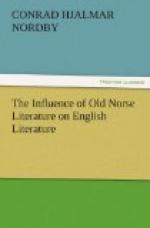In a novel love is almost indispensable; in a saga other forces are the impelling motives. Love-making gets the novelist’s tenderest interest and solicitude, but it receives little attention from the sagaman. Wooing under the Arctic Circle was a methodical bargaining, and there was little room for sentiment. When Thorvald asked for Osvif’s daughter Gudrun, the father “said that against the match it would tell that he and Gudrun were not of equal standing. Thorvald spoke gently and said he was wooing a wife, not money. After that Gudrun was betrothed to Thorvald.... He should also bring her jewels, so that no woman of equal wealth should have better to show.... Gudrun was not asked about it and took it much to heart, yet things went on quietly.” (Chap. XXXIV of Laxdaela.) In Iceland, as elsewhere, love was a source of discord, and for that reason love is always present in the saga. It is not the tender passion there, silvered with moonlight and attended by song. The saga is a man’s tale.
The translation just referred to is in The Temple Classics, published by J.M. Dent & Co., London, 1899, and edited by Israel Gollancz. The editor promises (p. 273) other sagas in this form, if Mrs. Press’s work prove successful. He speaks of Njala and Volsunga as imminent. It is to be hoped that the intention is to give the Dasent and the Morris versions, for they cannot be excelled.
FOOTNOTES:
[Footnote 1: Quoted in Gray, by E.W. Gosse, English Men of Letters, p. 163.]
[Footnote 2: B. Hoff. Hovedpunkter af den Oldislandske litteratur-historie. Kobenhavn. 1873.]
[Footnote 3: Pp. xli-l in Selections from the Poetry and Prose of Thomas Gray, edited by W.L. Phelps. Ginn & Co., Boston. 1894.]
[Footnote 4: Life of Gray, pp. 160 ff.]
[Footnote 5: Wm. Sharp in Lyra Celtica, p. xx. Patrick Geddes and Colleagues. Edinburgh. 1896.]
[Footnote 6: Of Heroic Virtue, p. 355, Vol. III of Sir William Temple’s Works. London. 1770.]
[Footnote 7: Of Heroic Virtue, p. 356.]
[Footnote 8: Of Poetry, p. 416.]
[Footnote 9: Spelling and punctuation are as in the original.]
[Footnote 10: Stopford Brooke, English Literature. D. Appleton & Co., New York. 1884. p. 150.]
[Footnote 11: Vol. 3, pp. 146-311.]
[Footnote 12: Quoted in Introduction, p. vii.]
[Footnote 13: Memoirs of the Life of Sir Walter Scott, Bart., Vol. I, p. 231. Boston, Houghton, Osgood & Co. 1879.]
[Footnote 14: Edinburgh Review, Oct., 1806.]
[Footnote 15: Quoted in Lockhart’s Life, Vol. III, p. 241.]
[Footnote 16: In G.W. Dasent’s Life of Cleasby, prefixed to the Icelandic-English Dictionary. Based on the MS. collection of the late Richard Cleasby, enlarged and completed by Gudbrand Vigfusson. Oxford. 1874.]




